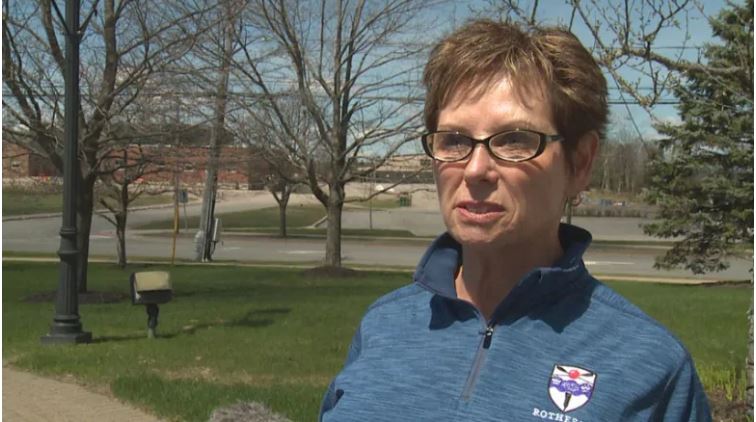When wildfires threatened Lytton First Nation in 2021, Warren Brown was essential in protecting his community’s water supply by staying behind—as others evacuated to safety—to ensure the water treatment plants remained up and running. He wanted to do everything he could to ensure his community had safe and clean drinking water to come home to. Warren’s commitment to caring for his community’s clean water supply continues to play a significant role in protecting their health and safety.
A landfill contaminated this couple's water and forced them to sell their home of 43 years
Now the Haughians say they're living a "nightmare" where the landfill has contaminated the water, forcing them to sell the home to the township. Mayor Arie Hoogenboom said the couple might have to leave once the sale is complete because it is a "liability" to the township if they stay and puts their health and safety at risk. The Haughians argue they're fine where they are, citing a filtration system and bottled water provided by the township. If they have to leave, they at least want to have a say on when.
Leduc launches voluntary residential water sampling campaign
The City of Leduc has implemented a Lead Management program to support the continued health and safety of residents. It is also part of a provincial requirement to ensure compliance with the lead level limit outlined in Health Canada’s Guidelines for Canadian Drinking Water Quality, which were updated in 2019. Leduc’s drinking water is safe and clean. This program is purely precautionary, and is required of all municipalities in Alberta. Health Canada has lowered the Maximum Acceptable Concentration (MAC) of lead in drinking water by 50 per cent, from 10 to 5 parts per billion (PPB), and changed the location of where compliance must be met from the system’s point of distribution to the customer’s tap.
Residents of Saskatoon area to benefit from upgrades to water, wastewater and solid waste infrastructure, and other community and green infrastructure projects
Today, the Honourable Jim Carr, the Government of Canada's Special Representative for the Prairies, on behalf of the Honourable Catherine McKenna, Minister of Infrastructure and Communities, the Honourable Don McMorris, Saskatchewan's Minister of Government Relations, and His Worship Charlie Clark, Mayor of the City of Saskatoon, announced more than $102 million in joint funding for 11 green infrastructure and COVID-19 resilience projects. The green infrastructure projects include upgrades to drinking water and wastewater systems, improvements to solid waste management, sidewalk expansion, and a new solar power plant. Several of those projects will help provide long-term reliable services to local communities while also contributing to a reduction in greenhouse gas emissions.
Canada and New Brunswick invest in Moncton's drinking water system to support residents
Today, the Honourable Ginette Petitpas Taylor, Member of Parliament for Moncton–Riverview–Dieppe, on behalf of the Honourable Catherine McKenna, Minister of Infrastructure and Communities; the Honourable Ernie Steeves, Minister of Finance and Member of the Legislative Assembly for Moncton–North; and Her Worship Dawn Arnold, Mayor of Moncton, announced funding for improvements to Moncton's potable water system. These upgrades will result in safer drinking water by implementing technology to remove harmful toxins that blue-green algae can produce in potable water systems.
Ottawa replaces federal bureaucrat working with Neskantaga First Nation during state of emergency
At the community's request, Indigenous Services Canada has replaced the top federal bureaucrat working with Neskantaga First Nation during its current state of emergency. Assistant deputy minister Joanne Wilkinson has taken over from Ontario regional director general Anne Scotton as the liaison between department officials and Neskantaga — a fly-in community about 450 km north of Thunder Bay, Ont., that has been under a boil-water advisory for 25 years.
Brown tap water causing concern in Langley Township
The brown water flowing from the taps in the Murrayville neighbourhood of Langley Township has some of the residents worried for their health and safety. Photos posted to the community Facebook page show drinking glasses, a sink and a hot tub full of foul-looking water. "None of us trust it and no one in their right mind would want to drink water that looks like that," said Krystal Woodward in a message to CBC News.
Rothesay mayor says cost of switching water systems shouldn't be put on tenants
The mayor of Rothesay says she's disappointed apartment owners have decided to pass the cost of switching their buildings to the municipal water system on to tenants.
"I don't think residents can afford that," said Rothesay Mayor Nancy Grant. "I think there might be other ways for apartment owners to handle that."
The city passed a bylaw requiring apartment building owners to switch to the municipal water system from well water and pay a consumption tax based on the amount of water used. Council approved the changes in March and sent a letter to apartment owners.









